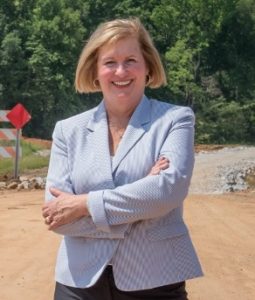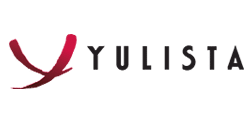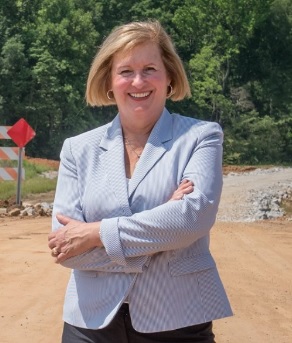The Huntsville/Madison County Chamber sent the following questions to candidates, to help you learn more about the people running in the August 28 Municipal Election. Here are the responses from Jennie Robinson, candidate for City Council District 3:

Jennie Robinson
Q: We all know there is a limited amount of money to meet a large variety of requests the City Council receives. If elected, how would you prioritize the requests for support that come before City Council for consideration?
A: The City’s Appropriations Budget is almost $17 million and includes funding support for organizations that provide direct community service including the library, jail and Mental Health Center. The Chamber’s $275,000 contract is also funded out of the Appropriations Budget because of its direct impact on the City. In addition, we receive numerous requests every year for new support or increased support from nonprofit agencies that are not directly related to City services. These are challenging requests and we struggle to meet all the requests for support. Since I work in the nonprofit world in my “day job,” I look at allocations to these agencies as grants that are given with the expectation that life in the community will be improved in some measurable way. As a result of this unique perspective, I would like to move toward a more formal grant process for agencies which would include proposals, projected budgets, and outcomes. Each grant would be for one year and would be evaluated annually. Priority would be given to funding programs that avoid duplication and that include collaboration, resource sharing, and a plan for sustainability. Most importantly, renewal or increases would be based on accountability for results and demonstrated community impact.
Q: What would be your top priority if you are elected and how would you address it?
A: Now that the overpass mainline is open, the redevelopment of Haysland Square and the South Parkway has become a top priority in my district. We only get one chance to reclaim an area when the paint starts peeling. If we wait too long, revitalizing the area becomes much more challenging and we put surrounding property values in jeopardy. We are addressing decline on the South Parkway by working with the South Huntsville Business Association (SHBA) and MainStreet Alabama on the UrbanMain project. We recently held community engagement sessions that told us people are excited about the potential in the South Parkway area. We will work with MainStreet and SHBA for three years to execute a strategic plan built around MainStreet’s Four Point process: organization, branding and promotion, design, and economic vitality. This is our opportunity to rebuild, recreate, and rebrand South Huntsville’s main commercial corridor. If we can redevelop the Haysland area with the right projects, there will be a ripple effect that will permit us to recruit new restaurants, retail, residential, and commercial space all along the South Parkway. And lessons learned on this project can be replicated in other areas of Huntsville to revitalize struggling commercial areas throughout our community.
Q: One of our greatest strengths is that we have a “small town feel” with mid-size city amenities. Do you agree with that statement? How would you approach your role as it relates to maintaining what is unique/special about Huntsville?
A: Huntsville is spread over 218 square miles (and counting). Our footprint creates challenges for identity as well as infrastructure as we creep across annexed areas in three counties. The South Parkway UrbanMain project rose out of SHBA’s desire to create a unique identity for the South Parkway. Similar projects that create a special sense of place could strategically create community nodes in all areas of Huntsville. Each council member could work with residents and businesses to create an identity for surrounding neighborhoods that attract businesses with a special fit for an area. That identity could be created around music, art, sports, recreation or history. We could see community nodes develop in Five Points, around Lowe Mill, and in the historic area near Alabama A&M. These nodes would have their own brand based on neighborhoods and a special community vibe that draws residents and visitors. Intentional place making will help us keep that small town feel in strategic centers across our large urban area.
Q: How do you feel the City of Huntsville and the Huntsville City School System should work together to ensure that our young people receive a quality education?
A: When I left my service on the school board and began serving on the council, I learned very quickly that I needed to “stay in my lane.” That meant leaving the work of the school system to the superintendent and board and focusing on my job—roads, ditches, and garbage. But it also meant keeping an eye on economic development and quality of life. Schools are critical to both so the City has a vital interest in the quality of education. One of the most important ways the City can support the school system is to continue to grow the tax base. Economic development is the best way to support our schools and ensure a quality education for our students. If we can take vacant land that is being taxed at a lower level or not yielding any taxes and build a multimillion dollar plant on it, the increase in property tax yields big benefits to the school system. The best example is the new Facebook data facility. There were minimal incentives by the city and no abatements. As a result, HCS will immediately see a huge payoff on land that was previously yielding no property tax. And that tax money can go straight to the classroom to support our students.
Q: What specific action or activity do you feel would most positively impact the attraction and retention of young professionals to our community?
A: We need millennial knowledge workers now more than ever to fill existing jobs and to keep the workforce promises we’ve made to new employers. Creating an attractive environment starts with a great quality of life including recreational opportunities and entertainment venues. Huntsville’s BIG PICTURE initiative helps create the kind of community that attracts Millennials. DHI will continue to create a downtown lifestyle that Millennials want and the South Huntsville Business Association is trying to “make South Huntsville cool again” with recreational activities at Ditto Landing and entertainment opportunities at Haysland. The expansion of our greenway system and bike trails and development of our riverfront will also strategically increase opportunities for recreation. The quality of our school system is also important to young families who are looking for good schools in great neighborhoods. A high quality education system and easily accessible recreation and entertainment sites attract young professionals and encourage them to stay.
Q: What do you feel is our community’s greatest strength, and how do you propose we build on it?
A: My husband and I moved to Huntsville in 1980 after completing our doctoral work at Purdue University. We intended to stay for a few years and move on. But we found our home here and raised our five children here. It is estimated that 70% of our residents are like my husband and me and have moved here from somewhere else. We come with different backgrounds, accents, talents, and perspectives. But we all call Huntsville home. The diversity of our people is our strength and the depth and breadth of our experience lends itself to innovation and collaboration. We work together as a community to do things no place else can do. That marvelous collaborative spirit has impressed corporate leaders around the country and they have brought their businesses to Huntsville as a result. We can leverage that spirit by intentionally fostering programs designed to quickly welcome and integrate newcomers to Huntsville, help them become connected to one another and the community, and make them aware of opportunities to contribute in their own unique way. Leadership Huntsville’s Focus program is a quick 2 ½ day community immersion platform that could be used on a broader basis with corporate newcomers and their family members to intentionally accelerate connection and collaboration.
Q: What do you feel is our community’s greatest weakness, and what is your plan to address it?
A: Our workforce is aging and 50% of our employees at all our major corporations, Redstone Arsenal, universities, and healthcare systems will retire in the next ten years. In the meantime, we have made promises to new businesses that expect to fill thousands of jobs when they open their new offices and plants in Huntsville. With increasing demand and shrinking supply, we have a knowledge and skill gap to meet the requirements of new and existing industry. We need to grow our workforce to meet those needs. Creating an environment that attracts young professionals including entertainment venues, recreational activities, great neighborhoods, and good schools for young families is critical. We also need to continue to partner with school systems, community colleges, and local universities to provide training programs targeted at specific skills such as building trades and additive manufacturing. Promoting STEM careers, encouraging technical certifications in high school, and developing internship programs will also create a targeted effort to “grow our own” workforce and ensure that we keep our promises to employers.
Q: In your decision-making process, how would you balance the needs of working for your district with those of the City of Huntsville as a whole?
A: Someone once said “All politics is local.” Since councilmembers are elected by district, our first responsibility is to the constituents who elected us. Fixing potholes, dealing with drainage ditches, and getting garbage collected are district specific concerns. We spend a lot of time answering emails and phone calls on a daily basis managing such local needs. But council meetings involve big picture issues that affect every district. That’s when we shed our district focus and look at the city as a whole. This is especially true of economic development projects. While an industry may locate in one district, the jobs generated and the expanded tax base impact all districts. Quality education is another area that requires council members to abandon a district focus. Because the City is judged by all the schools in our community, we need to focus on our most challenged schools wherever they are and ensure they have the resources they need to succeed. We also need to ensure that every child has an opportunity to learn and grow even if the students in our district are thriving. Not just because it helps us recruit businesses, but because it’s the right thing to do.



